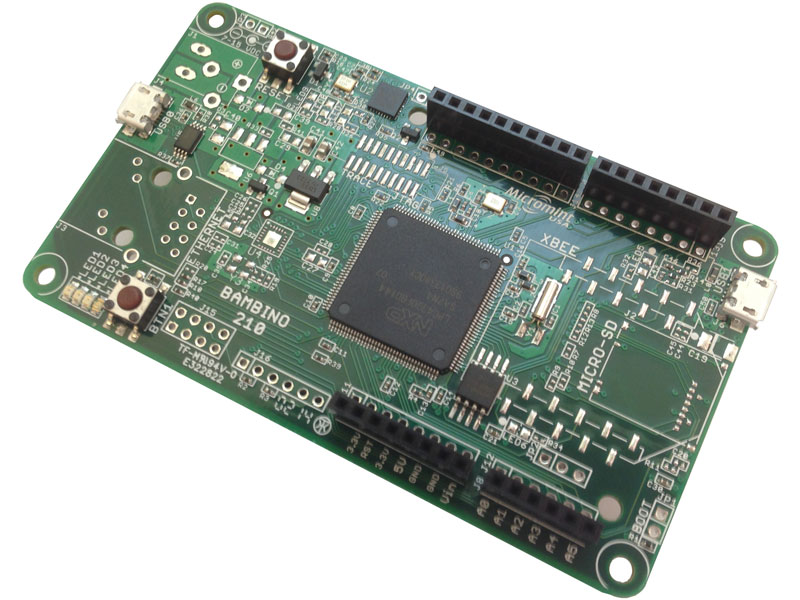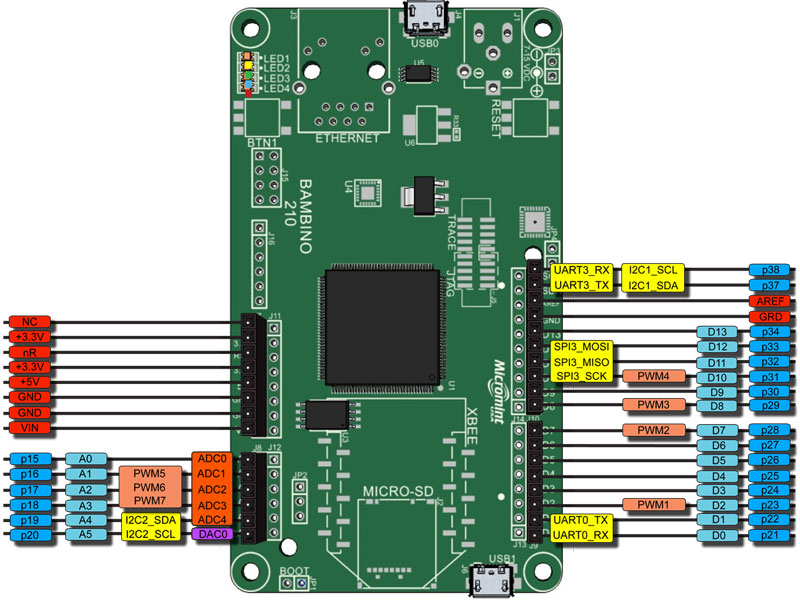You are viewing an older revision! See the latest version
bambino 210
Micromint Bambino 210

Overview¶
The Micromint Bambino 210 is a multi-core SBC designed for compatibility with the mbed framework. It is powered by an NXP LPC4330, the first dual-core ARM Cortex-M microcontroller. Its Cortex-M4 and Cortex-M0 cores are both capable of 204 MHz. With 264 KB SRAM onboard and 4 MB of flash, developers can fulfill demanding requirements in monitoring, instrumentation, data acquisition, process control and many other applications. Two USB device ports serve both as power sources and for data communications or debugging. I/O starts with two buttons and four LEDs and can be extended using Arduino compatible shields. Hardware and software licensing is open source, giving developers the freedom to adapt the Micromint Bambino to their specific requirements.
The mbed HDK adds an LPC11U35 microcontroller with the [[/handbook/cmsis-dap-interface-firmware|mbed CMSIS-DAP firmware] for better integration with mbed tools. It includes the following features:
- USB Mass Storage Device for drag and drop programming of the LPC4330
- USB Communications Device Class for Serial Communication with the LPC4330
- USB HID CMSIS-DAP for debugging LPC4330 firmware
- USB bootloader for updating the LPC11U35 firmware
Besides the built-in ports, boards can be ordered with an optional JTAG interface. A coin cell battery for the RTC, screw terminals for power and two PMOD interfaces can be easily implemented in the field by soldering components.
The Bambino 210 is available for under $27 in single quantities. Volume pricing and custom configurations are available by contacting our Sales staff at sales@micromint.com.
Pinout¶

Features¶
- NXP LPC4330 @ 204 MHz
- Dual core ARM® Cortex™-M4/M0
- 264 KB SRAM, 4 MB Flash
- High-speed USB 2.0 device port
- Full-speed USB 2.0 device port
- mbed HDK
- 2 buttons, 4 LEDs
- Arduino-compatible headers with up to
- 22 Digital I/O (GPIO)
- 6 Analog inputs (ADCs)
- 1 Analog output (DAC)
- 1 Serial Peripheral Interface (SPI)
- 2 Async serial ports (UARTs)
- 1 I2C port
NOTE: Functions are multiplexed on I/O pins as shown in pinout. Additional serial I/O can be enabled using SGPIO.
- Powered via USB
- Form factor 4” x 2.3” (101.6 x 58.4 mm)
Options¶
- JTAG interface
- RTC coin cell battery
- PMOD I2C interface
- PMOD SPI interface
See also¶
- Bambino 210 product page - General product info, online ordering
- Bambino wiki - Documentation, schematics, firmware updates
- NXP LPC43xx User Manual